We’re at the limits of the European Union—in more ways than one. We arrived yesterday (though it seems longer ago) in Athens, 1100 miles from 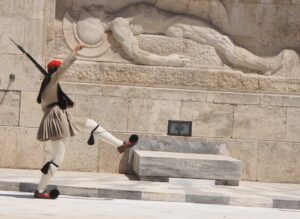 Berlin, via Warsaw on Lot Airlines—no doubt an event to be celebrated. We’re in the city with 5 million people, and it’s easy to talk about the birth of democracy. It happened here, and we’ve seen the love affair that Europe has had with Greece reflected in the museums in London, Paris, and Berlin. The independence of Greece from Turkey, in the 1820s, was partly Europe’s payback for that love affair.
Berlin, via Warsaw on Lot Airlines—no doubt an event to be celebrated. We’re in the city with 5 million people, and it’s easy to talk about the birth of democracy. It happened here, and we’ve seen the love affair that Europe has had with Greece reflected in the museums in London, Paris, and Berlin. The independence of Greece from Turkey, in the 1820s, was partly Europe’s payback for that love affair.
The heyday though (and Greece continues to cash in on it) was the Golden Age. Flush with its victories over the Persians in the 5th century, Pericles 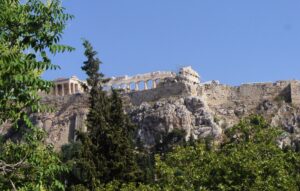 and his cohorts constructed on the Acropolis a literal “city on a hill” that has become the second most-desired site to see in the world (second to Angkor Wat). We visited the Acropolis this afternoon as part of our city-of-Athens tour, and really the major highlight of it. Perched atop the highest flat hill in Athens, the Greeks built temples to the main gods of the city, Athena (who supposedly gave the city olive trees), and Poseidon, who was the lord of the seas.
and his cohorts constructed on the Acropolis a literal “city on a hill” that has become the second most-desired site to see in the world (second to Angkor Wat). We visited the Acropolis this afternoon as part of our city-of-Athens tour, and really the major highlight of it. Perched atop the highest flat hill in Athens, the Greeks built temples to the main gods of the city, Athena (who supposedly gave the city olive trees), and Poseidon, who was the lord of the seas.
What remains from 2500 years of wars, Christianity, Islam, and pollution is still impressive. The Parthenon, the virgin Athena’s apartment, with its 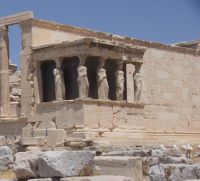 massive Doric pillars; the second temple to
massive Doric pillars; the second temple to 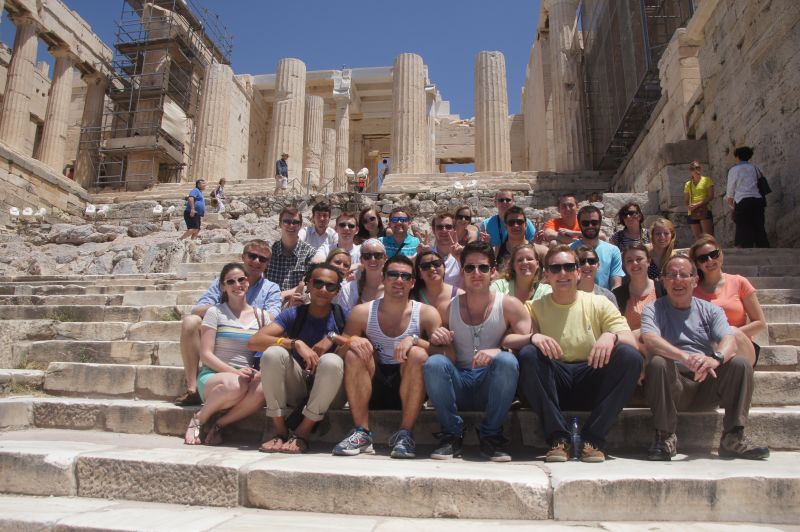 Poseidon and Athena has the Caryatids that support the roof, rather like the Museum of Science and Industry in Chicago. There’s also a temple to Athena Nike (victory) and another smaller temple at the entrance. The Acropolis was used by the Greeks, the Romans, then converted to a Church when the empire went Christian, then converted to a Mosque when the Turks conquered Greece, then reconverted to the Acropolis. One of the features we noted in London was the “Elgin Marbles” (saved from pollution and depredation, says the British Museum; stolen illegally, say the Greeks), the friezes that make up the story of the procession of Athena on the frieze at the Parthenon.
Poseidon and Athena has the Caryatids that support the roof, rather like the Museum of Science and Industry in Chicago. There’s also a temple to Athena Nike (victory) and another smaller temple at the entrance. The Acropolis was used by the Greeks, the Romans, then converted to a Church when the empire went Christian, then converted to a Mosque when the Turks conquered Greece, then reconverted to the Acropolis. One of the features we noted in London was the “Elgin Marbles” (saved from pollution and depredation, says the British Museum; stolen illegally, say the Greeks), the friezes that make up the story of the procession of Athena on the frieze at the Parthenon.
That was part of our city tour, though there really isn’t a lot to see in Athens; there’s a lot of temples from Greek and Roman days–the Romans adored Greek civilization, and helped spread it throughout the West. The 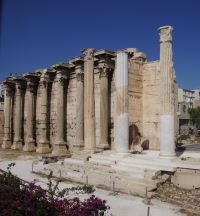 emperor Hadrian (2nd century) had a special place for Athens, completing the Temple of Zeus, begun 5 centuries earlier and a triumphal arch, etc. Athens, unlike Rome, wasn’t really the center of an Empire. Rather, our guide’s family background exemplifies the spread of Greek civilization; one parent has roots in Istanbul (Constantinople) and the other in Smyrna (Izmir in Turkey). Greek colonies dotted the eastern Mediterranean and the former Byzantine empire, lasting really until Ataturk in the 1920s fought to preserve and define a Turkish state that resulted in massive population movements of Greeks to Greece and Turks to Turkey.
emperor Hadrian (2nd century) had a special place for Athens, completing the Temple of Zeus, begun 5 centuries earlier and a triumphal arch, etc. Athens, unlike Rome, wasn’t really the center of an Empire. Rather, our guide’s family background exemplifies the spread of Greek civilization; one parent has roots in Istanbul (Constantinople) and the other in Smyrna (Izmir in Turkey). Greek colonies dotted the eastern Mediterranean and the former Byzantine empire, lasting really until Ataturk in the 1920s fought to preserve and define a Turkish state that resulted in massive population movements of Greeks to Greece and Turks to Turkey.
We had about two hours of free time which I used to do what I love to do—wander aimlessly, exploring. It gave me a new sense of ancient Greece 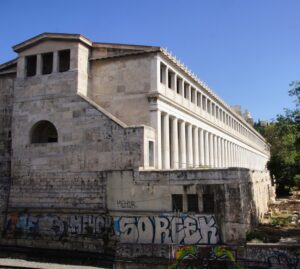 because I went to areas that I’d never been before, which are not really accessible by bus. The area is Monastiraki, an old monastery area at the base of the Acropolis, that is really the old town. One after another sights—the Roman baths, the library of Hadrian, the Tower of the Winds—all part of the ancient city artifacts, and all closed as of 3 pm. Can you believe that? Only one museum in the city is open after 3 pm….
because I went to areas that I’d never been before, which are not really accessible by bus. The area is Monastiraki, an old monastery area at the base of the Acropolis, that is really the old town. One after another sights—the Roman baths, the library of Hadrian, the Tower of the Winds—all part of the ancient city artifacts, and all closed as of 3 pm. Can you believe that? Only one museum in the city is open after 3 pm….
The other question was partially settled at our visit to PWC (no, not with an alum, but set up by Jim Majernick, with Price Waterhouse Cooper, who was a student on one May term trip in 2001 which went around the world—and I’m glad I kept in touch with him). PWC is a global accounting firm, which gave us an introduction to both Greece and the company. There’s no doubt that Greece is one of the problem children in the European Union. The  unemployment rate is staggering—almost 30 per cent in the country, and over 60 percent among people under 24. Even the optimistic folks at PWC admitted that Greeks have lived beyond their means, and needed some of the discipline imposed on the country as the price for the bailout funds that have kept it afloat. They were quick to note, however, that the press, especially CNN, has sensationalized the protests in Greece, hiring someone to launch tear gas for better pictures and a better story.
unemployment rate is staggering—almost 30 per cent in the country, and over 60 percent among people under 24. Even the optimistic folks at PWC admitted that Greeks have lived beyond their means, and needed some of the discipline imposed on the country as the price for the bailout funds that have kept it afloat. They were quick to note, however, that the press, especially CNN, has sensationalized the protests in Greece, hiring someone to launch tear gas for better pictures and a better story.
Whatever the truth (and we’re not going to Delphi for the oracle to predict the future or even give us a reading on the present), it’s pretty obvious that the EU is not the United States. The cultures, languages, histories, economies, are speed bumps in a flat world. Economically, for example, of the 27 countries, 17 use the Euro, which means that there is one monetary policy for 17 countries, and 17 fiscal policies for those countries, not to mention the other ten. I think the folks in Brussels who called it an “unprecedented experiment” and “a work in progress” may have described it best. It’s too entangled to be untangled easily.
We mused about this on our way to having dinner on the Saronic Gulf, watching the sunset over the ocean. I must say that the Olympics (we visited the 1896 site and passed by the 2004 village) in 2004 gave Greece a great public infrastructure, with a clean subway, but contributed part of the debt that, in the days of easy money, made everyone happy in the European Union. It’s pretty obvious we tourists are now among the happiest people in the European Union. Dining on saganaki and mousaka certainly helped.
Tomorrow we visit places that predate the golden age of Greece.